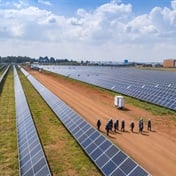
- The latest FNB Commercial Property Broker Survey indicates a weak perceived demand-supply balance in all three commercial property sectors.
- Johannesburg seems to have the weakest demand-supply balance for offices, retail and industrial property.
- In addition, the average time on the market for major commercial property has increased in the past six months.
The greater Johannesburg area seems to have the weakest demand-supply balance in the country for offices, retail and industrial property.
This is according to the FNB Commercial Property Broker Survey for the fourth quarter of 2020, which was released on Tuesday.
Market "weakness" refers to a relatively weak demand level in relation to supply.
The survey indicates that the weak perceived demand-supply balance in all three commercial property sectors in South Africa has continued in the fourth quarter of 2020, even after the easing of Covid-19 lockdown regulations.
The respondents surveyed seem to indicate that in all three commercial property classes - retail, office and industrial - the average time on the market has increased, compared to six months ago. This was a trend shown in all four quarterly surveys on commercial property FNB did in 2020.
"That the 'increasing time on market' bias became less pronounced in the fourth quarter survey, probably has much to do with the end of hard lockdowns a few months earlier. Six months prior to the fourth-quarter survey, it was difficult to do property trades in the midst of hard lockdowns," explains John Loos, property sector strategist at FNB Commercial Property Finance.
Industrial properties: Experts predict trends, risks and developments post-coronavirus | @Fin24 https://t.co/ZjugE7aEkA pic.twitter.com/075zIOZGXm
— News24 (@News24) April 16, 2020
"So, rather than seeing any meaningful market strengthening, over the six months to November 2020, we had merely seen a dramatic improvement in the ease of doing business since April or May. But the fact that the brokers still have a bias towards lengthening average time on [the] market continues to reflect the recessionary economic times in which South Africa finds itself."
The industrial property market is still perceived to be the strongest of the three major commercial property sectors. The three coastal metros - Cape Town, Nelson Mandela Bay and eThekwini - are where the relative industrial property market strength lies, the survey indicates. Johannesburg, on the other hand, appears especially weak in terms of industrial property.
Office property the weakest
The office property sector is seen as the weakest of the three major commercial property classes, with a significant proportion of survey respondents perceiving many companies to be re-assessing their office space requirements in light of the results of the lockdown-related remote working period.
According to the survey report by Loos, property brokers continue to see the office, retail and industrial property markets as substantially oversupplied. The office segment is the most oversupplied, especially in the Johannesburg metro area.
https://t.co/tgR9Z5oB3U | These are the top spots favoured by South Africans buying property overseas, and why https://t.co/NGSa3cbrQH
— Fin24 (@Fin24) February 1, 2021
"Given the major bias towards 'oversupply' in all three major commercial property markets, we remain of the expectation that 2021 will see a continuation of a decline in average values in commercial property, as was the case in 2020," predicts Loos.
The average time on the market for occupied industrial properties was regarded as about 23.26 weeks in the fourth quarter of 2020, compared to about 25.07 weeks for occupied retail property and 25.86 weeks for occupied office space. Vacant industrial properties averaged about 26.68 weeks on the market before they were sold, compared to 30.07 weeks in the case of vacant retail space and 29.30 weeks in the case of vacant office properties.
For Loos, the oversupply of commercial property in the country comes as little surprise, given that the economy had been stagnating for years prior to Covid-19 pandemic.
"That is almost undoubtedly an economic environment driving weak demand and strong supply of property on the market, and the broker survey continues to reflect this," says Loos.
"The oversupplied market leads us to continue to expect decline in average property values to continue in 2021. After a predicted -7% decline in average capital value in 2020, our forecast for 2021 has been a further -9% decline."




 Publications
Publications
 Partners
Partners












